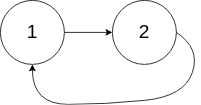142. Linked List Cycle II
Given a linked list, return the node where the cycle begins. If there is no cycle, return null.
To represent a cycle in the given linked list, we use an integer pos which represents the position (0-indexed) in the linked list where tail connects to. If pos is -1, then there is no cycle in the linked list.
Note: Do not modify the linked list.
Example 1:
Input: head = [3,2,0,-4], pos = 1 Output: tail connects to node index 1 Explanation: There is a cycle in the linked list, where tail connects to the second node.

Example 2:
Input: head = [1,2], pos = 0 Output: tail connects to node index 0 Explanation: There is a cycle in the linked list, where tail connects to the first node.

Example 3:
Input: head = [1], pos = -1 Output: no cycle Explanation: There is no cycle in the linked list.

Follow up:
Can you solve it without using extra space?
题意:判断链表中是否存在环,如果在则找出入口节点
代码如下:
/** * Definition for singly-linked list. * function ListNode(val) { * this.val = val; * this.next = null; * } */ /** * @param {ListNode} head * @return {ListNode} */ var detectCycle = function(head) { if(!head || !head.next) return null; let fNode=head,sNode=head; while(fNode && fNode.next){ fNode=fNode.next.next; sNode=sNode.next; if(fNode == sNode) break; } //如果不是环 if(fNode==null || fNode.next==null) return null; //是环,则sNode=head,fNode步长变为1,二者再次相遇在环的入口节点 sNode=head; while(fNode!=sNode){ fNode=fNode.next; sNode=sNode.next; } return sNode; };